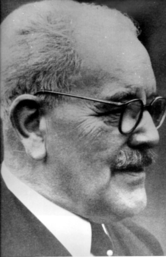Carl Otto von Eicken

Carl Otto von Eicken (31 December 1873, in Mülheim an der Ruhr – 29 June 1960, in Heilbronn) was a German otorhinolaryngologist.
He studied medicine at the universities of Kiel, Geneva, Munich, Berlin and Heidelberg, where he served as an assistant to surgeon Vincenz Czerny. He received his habilitation for laryngo-rhinology (1903) and otology (1909) at the University of Freiburg,[1] and in 1911 became a full professor at the University of Giessen, where subsequently, he was named head of the newly constructed ear, nose and throat clinic. In 1920/21 he served as university rector. In 1922 he succeeded Gustav Killian (a former teacher) at the University of Berlin, where he maintained a professorship up until 1950.[2][3]
He is largely known for developing methods of examination for the throat and pharynx. The eponymous "Eicken's method" is facilitation of hypopharyngoscopy by means of forward traction on the cricoid cartilage by a laryngeal probe.[4] He was the author of over 100 medical works — with Alfred Schulz van Treeck, he published an atlas on ear, nose and throat diseases, titled Atlas der Hals-, Nasen-, Ohren-Krankheiten (1940).[2][5]
References
- ↑ Karl Otto von Eicken at Who Named It
- 1 2 Carl Otto von Eicken, Vertreter der Hals-, Nasen- und Ohrenheilkunde in Giessen von 1910-1922
- ↑ Brann - Einslin / edited by Rudolf Vierhaus Deutsche Biographie Enzyklopaedie
- ↑ Stedman's Medical Eponyms by Thomas Lathrop Stedman
- ↑ Atlas der Hals-, Nasen, Ohren-Krankheiten ZVAB.com